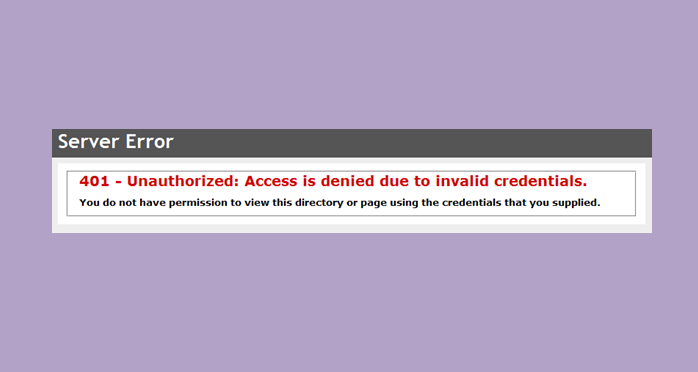401 Unauthorized Error is an HTTPS status error that may be encountered in any kind of browser like Edge, Firefox, Google Chrome, etc. Basically, the error is displayed when there is a problem loading a webpage.

On an everyday basis, we stumble across several websites. We subscribe to many online services, news blogs, and many other special offers by simply signing in to their page by linking to our social media accounts like Facebook or Google accounts. Moreover, linking user accounts from various identity providers essentially eases the process of authentication to the user and also helps the sites to recognize the identity of users in granting website access. While it’s hard for us to remember the sites and services we have signed on the internet, our systems keep track of all those logins. This primarily offers a hassle-free surfing experience with easy login access to the websites.
You may have come across an instance wherein you encounter 401 Unauthorised Access is denied due to invalid credentials error alert on logging into few websites. The 401 error message is usually displayed on the site that requires user credentials. So if you have got this error then it probably means you entered an invalid username or password.
However, there are cases wherein you encounter these faulty errors in spite of having a valid credential. Moreover, these errors may appear in different ways like 401 Unauthorized, HTTP Error 401- Unauthorised or Authorization Required; but they all mean the same. The error messages are often modified by websites and are displayed inside the browser depending on the website you log in. In this article, we will discuss the solutions to fix this error.
Fix 401 Unauthorized Error
Check for Invalid URL
Many times, you may give a wrong URL or try to open a URL link that is reserved for only authorized users. In this scenario, a 401 error is displayed. So, before you type any URL, make sure that you give a valid address.
Invalid Login Credentials
It’s quite natural that remembering those large scales of passwords is an outright strenuous task. If you get the 401 error after login, it means the username or password you provided is invalid. In this case, use the website’s built-in password reset to set a new password and follow the process mentioned on the website. The process is easy if you have registered the website with a valid email address in the initial phase, otherwise you may want to contact the website admin to regain access.
Search for a Secure Accessing option in the website’s main page
If you have a valid URL name and you are still seeing the 401 error then it’s quite possible that you are not logged into the website. In this case, visit the website’s main page and search for an option that says ‘Secure Access’. Give your credentials on the login page and try to load the page. If you don’t have credentials then you may want to set up an account. This is done simply by following the instructions given on the website.
False Login Requisite by the Host server
While a 401 error is a client-side error, a user error on the server side can result in a false login requirement. The 401 error is displayed to anyone visiting the website by mistake. For instance, on the server side, the network administrator may enable all users to log in with authentication even when it is not required. This causes a problem for normal website users as the error message is displayed to anyone visiting the site. In this case, the only way to resolve the problem is to inform the website by contacting the administrator.
Hope this helps!
Leave a Reply